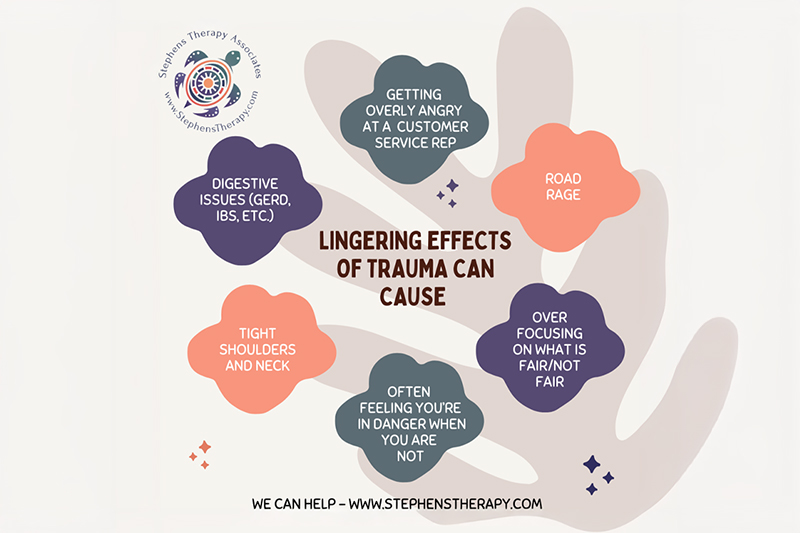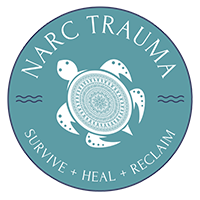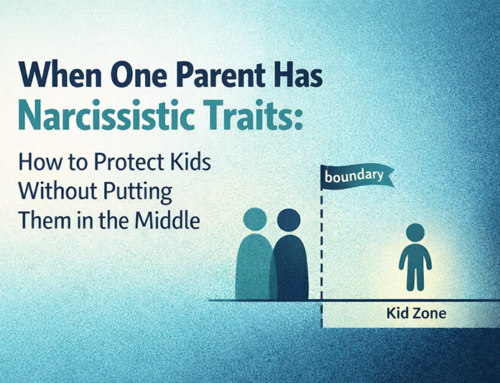The Lingering Effects of Trauma

By Brenda Stephens, Licensed Professional Clinical Counselor
Dr. Bessel Van Der Kolk, author of “The Body Keeps The Score,” said that the lingering effect of trauma is that we react to mild stressors as if we are still in the original danger of the trauma. This means our brains and bodies can be (and are likely) in fight/flight, freeze/fawn, or other defensive states when we are actually safe. This state of being is mentally and physically exhausting and takes a huge toll on us. This fear often comes out in ways we don’t realize, like road rage, anger at the cashier at the coffee shop that doesn’t match the situation, reluctance to leave the house, and a plethora of other manifestations.
Trauma is a profound psychological experience that leaves an indelible mark on an individual’s psyche. While the initial shock and intensity of a traumatic event can fade over time, the lingering effects often persist, subtly weaving themselves into the fabric of daily life. One of the most pervasive and challenging consequences of trauma is the continued reaction to mild stressors as if one is in immediate danger. This phenomenon highlights the profound impact trauma can have on the nervous system and our perception of safety.
Understanding the Nature of Trauma: Trauma can arise from various sources, including but not limited to physical or emotional abuse, accidents, natural disasters, or witnessing violence. The common thread in all these experiences is the overwhelming sense of fear, helplessness, and the inability to escape or control the situation. During such events, the body’s fight-or-flight response is activated, releasing stress hormones like adrenaline and cortisol. This response is a survival mechanism designed to protect us from immediate harm.
The Persistent Alarm System: For many trauma survivors, the body’s alarm system remains on high alert long after the danger has passed. This condition is often associated with Post-Traumatic Stress Disorder (PTSD) but can also affect individuals without a formal diagnosis. The brain, particularly the amygdala (the area responsible for processing emotions such as fear), becomes hyper-vigilant. It interprets minor stressors—such as a loud noise, a sudden movement, or even a specific smell—as threats. The amygdala starts to see everyday stressors as life-threatening events.
This hyper-reactivity is not a sign of weakness or overreaction but a biological imprint left by trauma. The brain’s wiring has been altered by the traumatic experience, making it difficult to differentiate between real danger and benign situations.
The Impact on Daily Life: The persistent hyper-vigilance and overreaction to stressors can significantly impact a person’s daily life. Those affected may experience a range of symptoms, including:
Physical Reactions: Sweating, rapid heartbeat, and muscle tension can occur in response to seemingly minor triggers.
Emotional Responses: Feelings of fear, anxiety, irritability, or sadness can be triggered by non-threatening situations.
Behavioral Changes: Avoidance of specific places, people, or activities that might remind the individual of the trauma.
Cognitive Effects: Difficulty concentrating, negative thinking patterns, and a persistent sense of doom or danger.
Breaking the Cycle: While the lingering effects of trauma can feel overwhelming, there are avenues for healing and strategies to manage these responses:
Therapy: Psychological interventions, particularly trauma-focused therapies such as Eye Movement Desensitization and Reprocessing (EMDR) and Cognitive Behavioral Therapy (CBT), have shown great efficacy in helping individuals process and reframe their traumatic experiences.
Mindfulness and Relaxation Techniques: Practices like mindfulness meditation, deep breathing exercises, and progressive muscle relaxation can help calm the hyperactive nervous system and create a sense of safety in the present moment.
Building a Support System: Connecting with supportive friends, family, or support groups can provide comfort and validate experiences. Talking about trauma with others who understand can be incredibly healing.
Lifestyle Changes: Regular exercise, a balanced diet, and adequate sleep are foundational to maintaining physical health and can have a positive impact on mental well-being
Self-Care and Routine: Establishing a regular routine and engaging in activities that bring joy and relaxation can provide a stabilizing structure and foster a sense of normalcy and safety.
The Road to Recovery: Recovering from the lingering effects of trauma is a journey—often a long and nonlinear one. It takes a lot of time, but there are small rewards all along the way. It’s important for those affected to remember that seeking help and taking small steps toward healing are significant accomplishments. Over time, with patience and perseverance, the brain’s wiring can begin to shift, creating new patterns that allow for healthier responses to stress, and you’ll be grateful you did the work.
The Power of Resilience: Despite trauma’s profound impact on individuals, the human spirit’s resilience is remarkable. Many trauma survivors not only manage their symptoms but go on to lead fulfilling, meaningful lives. Understanding the lingering effects of trauma and implementing strategies for recovery can empower individuals to reclaim their sense of safety, peace, and control over their lives.
In conclusion, while the shadow of trauma may linger, it does not define one’s future. With the right tools and support, trauma survivors can navigate their responses to stress, fostering a life that acknowledges the past but is not constrained by it. This journey of healing underscores the resilience and strength inherent in each individual, illuminating the path from fear to empowerment.
At Stephens Therapy Associates, we specialize in working with trauma of all kinds and the lingering effects it causes. Our mission is your well-being, and we can help.







